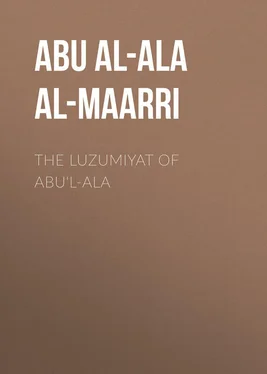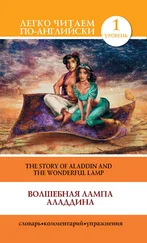Abu al-Ala al-Maarri - The Luzumiyat of Abu'l-Ala
Здесь есть возможность читать онлайн «Abu al-Ala al-Maarri - The Luzumiyat of Abu'l-Ala» — ознакомительный отрывок электронной книги совершенно бесплатно, а после прочтения отрывка купить полную версию. В некоторых случаях можно слушать аудио, скачать через торрент в формате fb2 и присутствует краткое содержание. Издательство: Иностранный паблик, Жанр: foreign_language, foreign_antique, foreign_prose, на английском языке. Описание произведения, (предисловие) а так же отзывы посетителей доступны на портале библиотеки ЛибКат.
- Название:The Luzumiyat of Abu'l-Ala
- Автор:
- Издательство:Иностранный паблик
- Жанр:
- Год:неизвестен
- ISBN:нет данных
- Рейтинг книги:5 / 5. Голосов: 1
-
Избранное:Добавить в избранное
- Отзывы:
-
Ваша оценка:
- 100
- 1
- 2
- 3
- 4
- 5
The Luzumiyat of Abu'l-Ala: краткое содержание, описание и аннотация
Предлагаем к чтению аннотацию, описание, краткое содержание или предисловие (зависит от того, что написал сам автор книги «The Luzumiyat of Abu'l-Ala»). Если вы не нашли необходимую информацию о книге — напишите в комментариях, мы постараемся отыскать её.
The Luzumiyat of Abu'l-Ala — читать онлайн ознакомительный отрывок
Ниже представлен текст книги, разбитый по страницам. Система сохранения места последней прочитанной страницы, позволяет с удобством читать онлайн бесплатно книгу «The Luzumiyat of Abu'l-Ala», без необходимости каждый раз заново искать на чём Вы остановились. Поставьте закладку, и сможете в любой момент перейти на страницу, на которой закончили чтение.
Интервал:
Закладка:
The Luzumiyat of Abu'l-Ala / Select from his Luzum ma la Yalzam and Suct us-Zand
TO ABU’L-ALA
In thy fountained peristyles of Reason
Glows the light and flame of desert noons;
And in the cloister of thy pensive Fancy
Wisdom burns the spikenard of her moons.
Closed by Fate the portals of the dwelling
Of thy sight, the light thus inward flowed;
And on the shoulders of the crouching Darkness
Thou hast risen to the highest road.
I have seen thee walking with Canopus
Through the stellar spaces of the night;
I have heard thee asking thy Companion,
“Where be now my staff, and where thy light?”
Abu’l-Ala, in the heaving darkness,
Didst thou not the whisperings hear of me?
In thy star-lit wilderness, my Brother,
Didst thou not a burdened shadow see?
I have walked and I have slept beside thee,
I have laughed and I have wept as well;
I have heard the voices of thy silence
Melting in thy Jannat and thy hell.
I remember, too, that once the Saki
Filled the antique cup and gave it thee;
Now, filled with the treasures of thy wisdom,
Thou dost pass that very cup to me.
By the God of thee, my Syrian Brother,
Which is best, the Saki’s cup or thine?
Which the mystery divine uncovers —
If the cover covers aught divine.
And if it lies hid in the soul of silence
Like incense in the dust of ambergris,
Wouldst thou burn it to perfume the terror
Of the caverns of the dried-up seas?
Where’er it be, Oh! let it be, my Brother. —
Though “thrice-imprisoned,” 1 1 In one of his poems he speaks of three prisons, his body being the third. Here is Professor Nicholson’s translation: Methink I am thrice-imprisoned – ask not me Of news that need no telling — By loss of sight, confinement in my house, And this vile body for my spirit’s dwelling.
thou hast forged us more
Solid weapons for the life-long battle
Than all the Heaven-taught Armorers of yore.
“Thrice-imprisoned,” thou wert e’en as mighty,
In the boundless kingdom of the mind,
As the whirlwind that compels the ocean,
As the thunder that compels the wind.
“Thrice-imprisoned,” thou wert freer truly
Than the liegeless Arab on his mare, —
Freer than the bearers of the sceptre, —
Freer than the winged lords of the air.
“Thrice-imprisoned,” thou hast sung of freedom
As but a few of all her heroes can;
Thou hast undermined the triple prison
Of the mind and heart and soul of man.
In thy fountained peristyles of Reason
Glows the light and flame of desert noons;
And in the cloister of thy pensive Fancy
Wisdom burns the spikenard of her moons.
When Christendom was groping amid the superstitions of the Dark Ages, and the Norsemen were ravaging the western part of Europe, and the princes of Islam were cutting each other’s throats in the name of Allah and his Prophet, Abu’l-Ala’l-Ma’arri was waging his bloodless war against the follies and evils of his age. He attacked the superstitions and false traditions of law and religion, proclaiming the supremacy of the mind; he hurled his trenchant invectives at the tyranny, the bigotry, and the quackery of his times, asserting the supremacy of the soul; he held the standard of reason high above that of authority, fighting to the end the battle of the human intellect. An intransigeant with the exquisite mind of a sage and scholar, his weapons were never idle. But he was, above all, a poet; for when he stood before the eternal mystery of Life and Death, he sheathed his sword and murmured a prayer.
Abu’l-Ala’l-Ma’arri, 2 2 My learned friend, Count E. de Mulinen, called my attention to the work of Von Kremer on Abu’l-Ala. And I have seen copies of a certain German Asiatic Review in which were published translations, made by that eminent Orientalist, of many poems from the Luzumiyat. He speaks of Abu’l-Ala as one of the greatest moralists of all times, whose profound genius anticipated much that is commonly attributed to the so-called modern spirit of enlightenment. Professor D. S. Margoliouth has also translated into English the Letters of Abu’l-Ala, which were published with the Arabic Text at the Clarendon Press, Oxford, 1898. Also Professor Raynold A. Nicholson, in his work, “A Literary History of the Arabs,” discusses the poet at length and renders into English some poems from the Luzumiyat. A work was published by Charles Carrington, Paris, 1904, under the title, “Un Précurseur d’Omar Khayyam, Le Poéte Aveugle: Extraits de Poémes et de Lettres d’Abu’l-Ala al-Ma’arri.” And another, “The Diwan of Abu’l-Ala,” done into English by Henry Baerlein, who must have helped himself freely to the Quatrains of Von Kremer.
the Lucretius of Islam, the Voltaire of the East, was born in the spring of the year 973 A.D., in the obscure village of Ma’arrah, 3 3 For a picturesque description of the squalidness and sordidness of Ma’arrah and its people, see Letter XX of “The Letters of Abu’l-Ala,” Oxford Edition.
which is about eighteen hours’ journey south of Halab (Aleppo). And instead of Ahmad ibn Abdallah ibn Sulaiman ut-Tanukhi (of the tribe of Tanukh), he was called Abu’l-Ala (the Father of the Sublime), by which patronymic of distinction he is popularly known throughout the Arabic speaking world.
When a boy, Abu’l-Ala was instructed by his father; and subsequently he was sent to Halab, where he pursued his studies under the tutelage of the grammarian Muhammad ibn Abdallah ibn us-Sad. His literary proclivity was evinced in his boyhood, and he wrote verse, we are told, before he was ten. Of these juvenile pieces, however, nothing was preserved.
He was about five years old when he fell a victim to small-pox and almost lost his sight from it. But a weakness in his eyes continued to trouble him and he became, in middle age, I presume, totally blind. 4 4 When he visited Baghdad he was about thirty-seven years of age. And when he went to attend a lecture there by one of the leading scholars, he was called by the lecturer, istabl , which is Syrian slang for blind.
Some of his biographers would have us believe he was born blind; others state that he completely lost his sight when he was attacked by the virulent disease; and a few intimate that he could see slightly at least with the right eye. As to whether or not he was blind when he was sent to Halab to pursue his studies, his biographers do not agree. My theory, based on the careful perusal of his poems and on a statement advanced by one of his biographers, 5 5 “He was four years of age when he had the attack of small-pox. The sight of his left eye was entirely lost and the eyeball of his right had turned white. Al-Hafiz us-Silafi relates: ‘Abu Muhammad Abdallah told me that he visited him (Abu’l-Ala) once with his uncle and found him sitting on an old hair matting. He was very old, and the disease that attacked him in his boyhood had left its deep traces on his emaciated face. He bade me come near him and blessed me as he placed his hand on my head. I was a boy then, and I can picture him before me now. I looked into his eyes and remarked how the one was horribly protruding, and the other, buried in its socket, could barely be seen.’” – Ibn Khillikan.
is that he lost his sight gradually, and total blindness must have come upon him either in his youth or his middle age. 6 6 “How long he retained any sort of vision is not certain. His frequent references in his writings to stars, flowers, and the forms of the Arabic letters imply that he could see a little at least some years after this calamity.” – D. S. Margoliouth: The Letters of Abu’l-Ala. “He used to play chess and nard .” – Safadi.
Were we to believe that he was born blind or that he suffered the complete loss of his sight in his boyhood, we should be at a loss to know, not how he wrote his books, for that was done by dictation; not how he taught his pupils, for that was done by lectures; but how he himself was taught in the absence in those days of a regular system of instruction for the blind.
Интервал:
Закладка:
Похожие книги на «The Luzumiyat of Abu'l-Ala»
Представляем Вашему вниманию похожие книги на «The Luzumiyat of Abu'l-Ala» списком для выбора. Мы отобрали схожую по названию и смыслу литературу в надежде предоставить читателям больше вариантов отыскать новые, интересные, ещё непрочитанные произведения.
Обсуждение, отзывы о книге «The Luzumiyat of Abu'l-Ala» и просто собственные мнения читателей. Оставьте ваши комментарии, напишите, что Вы думаете о произведении, его смысле или главных героях. Укажите что конкретно понравилось, а что нет, и почему Вы так считаете.












